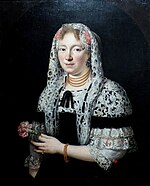Andrzej Stech
Andreas Stech | |
|---|---|
 Self-portrait. circa 1675 | |
| Born | Andreas Stech 9 September 1635 |
| Died | 12 January 1697 (aged 61) Danzig, (Gdańsk) |
| Known for | Painting |
| Movement | Baroque |
| Spouse | Adelgunde Wulf |
Andreas Stech (September 9, 1635 – January 12, 1697) was a Baroque painter.
Stech was born in Stolp (Słupsk), the son of Heinrich Stech a painter from Lübeck.[1] He was of Lutheran faith.[2] In 1636, together with his family he moved to Danzig (Gdańsk). It is most likely that he was taught by his father; from 1653, by his father-in-law Adolf Boy (1612-1683). In 1658, he married the widow of the painter August Ranisch. After the death of his first wife, he married Adelgunde, the daughter of Nicias Wulf.[3] He had five children from his first marriage, and four from his second. In 1662, he became the Master Artisan on the basis of his artwork: The Calling of St. Andrew and Croesus throwing himself in the fire. In 1667, he received Danzig citizenship.[4] In 1673, he became a juror. From 1677, he worked for King John III Sobieski of the Polish–Lithuanian Commonwealth. His brother was also a painter.[5]
-
Portrait of Heinrich Schwarzwaldt
(1682) -
Portrait of a Patrician Lady from Danzig
(1685) -
Portrait of a townsman from Danzig
(1675) -
Portrait of Zasławski-Ostrogski
(1670)
References
- ^ "Biography". Antykwariat Kwadryga. Retrieved 22 October 2015.
- ^ Adam, Wolfgang; Westphal, Siegrid (6 December 2012). Handbuch der kulturellen Zentren der frühen Neuzeit. p. 306. ISBN 9783110295559.
- ^ biography of Andreas Stech
- ^ "Andrzej Stech Biography". Culture. Retrieved 22 October 2015.
- ^ "Andrzej Stech Paintings". Pinakoteka. Retrieved 22 October 2015.
External links
![]() Media related to Andreas Stech at Wikimedia Commons
Media related to Andreas Stech at Wikimedia Commons




